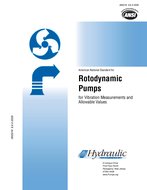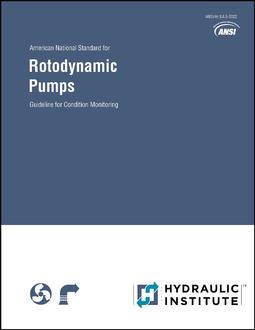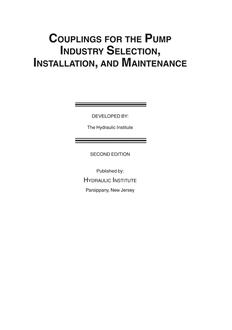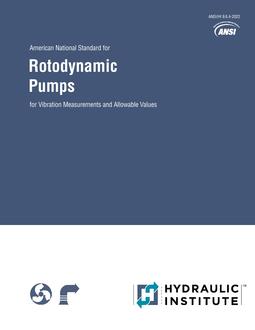
HI 9.6.4-2009
- Comments Off on HI 9.6.4-2009
- HI
Click here to purchase
This standard applies to all industrial/commercial centrifugal and vertical pumps. It covers the vibration measurement and allowable vibration limits. The tutorial information on vibration dynamic analysis, which was included in the 2000 version of this standard has been removed from this document and is to be published in a new guideline, ANSI/HI 9.6.8 Dynamics of Pumping Machinery.
The scope of application of the standard has been clarified to identify pump types that are excluded from the standard. Metric units are now primary, with US customary units secondary. For speeds above 600 rpm, the measurement quantity to be used for measuring the vibration of nonrotating parts of rotodynamic pumps is velocity in millimeters per second RMS or inches per second RMS. Additional requirements have been added for operational speeds 600 rpm and lower. For speeds 600 rpm and below, measurement of the overall peak-to-peak displacement is required in addition to overall RMS velocity.
The Hydraulic Institute standard pump type nomenclature provided in ANSI/HI 1.1-1.2 Rotodynamic (Centrifugal) Pumps for Nomenclature and Definitions and ANSI/HI 2.1-2.2 Rotodynamic (Vertical) Pumps for Nomenclature and Definitions has been incorporated, with a new system of icons introduced to assist the user in recognizing the pump types and identifying the measurement locations.
Although this standard requires that the vibration test location is in the field by default, levels are provided for optional factory tests for most pump types. The allowable vibration requirements have been updated to reflect acceptable performance both for field and factory tests, based on hundreds of data points obtained in surveys conducted since the publication of the previous edition. The revised allowable values have been compared with those presented by other standards organizations, including ISO and API, and can be considered as commensurate.
Values are presented for preferred operating region (POR) and allowable operating region (AOR). To assist the user of the standard the following are provided as appendices:
- suggested vibration test report form
- Recommended default initial field alarm and trip settings
- A vibration troubleshooting chart
- Information on transducer types, mounting, and sensitivity
Product Details
- Published:
- 2009
- ANSI:
- ANSI Approved
- Number of Pages:
- 40
- File Size:
- 1 file , 720 KB



